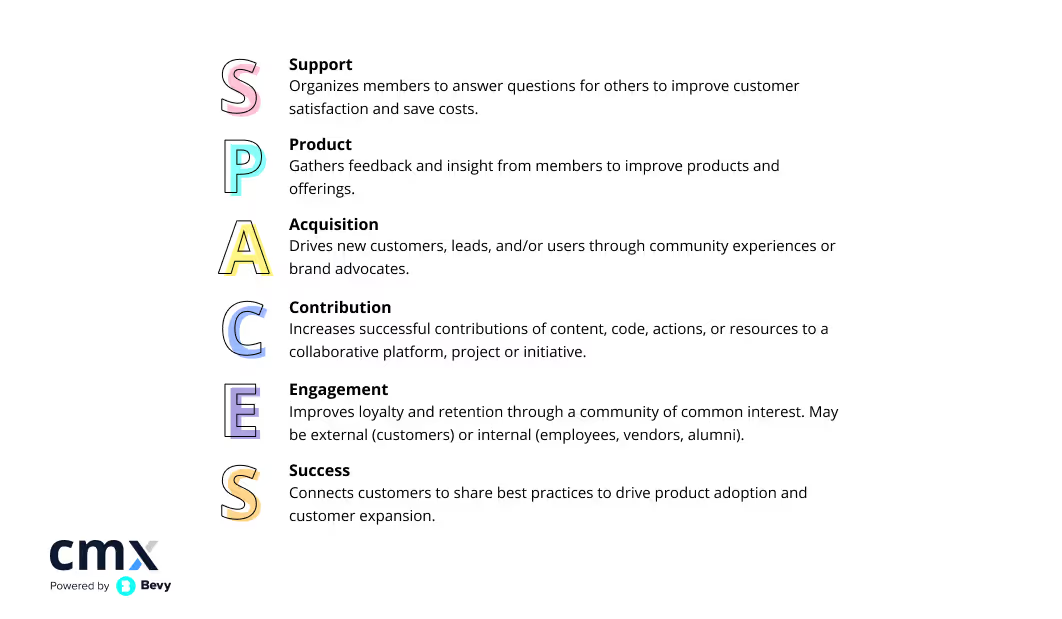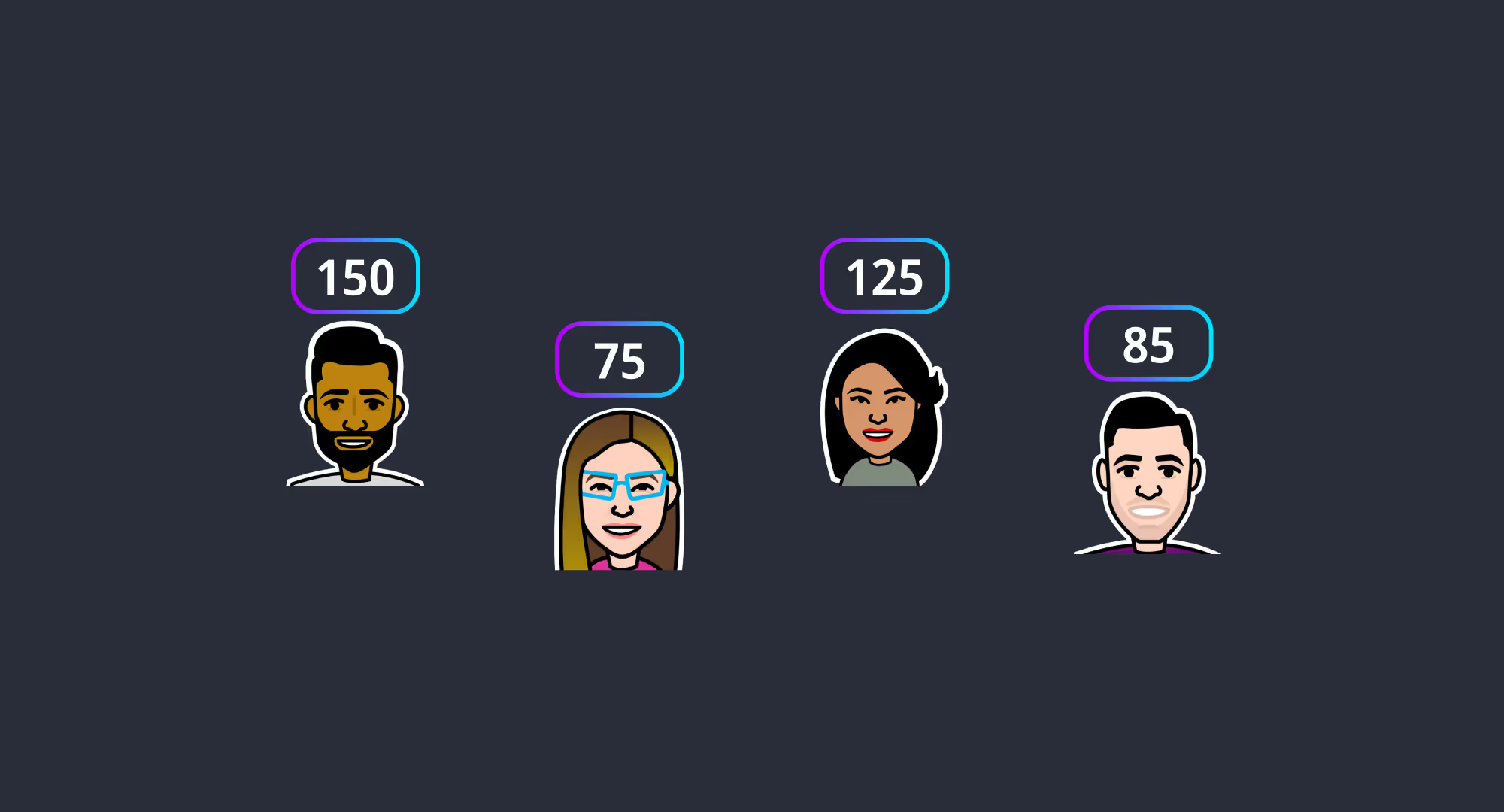On August 28, 2024, Bevy.com hosted a webinar in partnership with CMX on the subject of integrating community into your GTM (go-to-market) strategy. The presenters for the event were Beth McIntyre, Bevy/CMX Director of Community, Denise Hontiveros, Head of Marketing, and Sunny Prabhakar, Growth Director.
The Business Level of Community Strategy and the SPACES Model
The webinar began by discussing the first of three community strategy levels, the Business level. It’s at this level where business goals are defined and what you as a marketer hope to achieve through your community is identified.
The SPACES model lists the six possible business outcomes of a community that can be used to define your community’s business value.

This post focuses primarily on the “A” of the SPACES model: Acquisition. If businesses can use communities to build customer loyalty and develop their relationships with prospects, they can turn customers into a driving force for growth.
How Community Drives Growth
Communities can increase awareness by spreading the word to those inside and outside the community. Communities can also drive leads and grow your sales pipeline which leads directly to more educated and informed prospects.
Finally, a strong community can help your sales team overcome objections. Prospects with questions can turn to the community for answers, showing the credibility of both the product and the company.
Top Metrics for Acquisition Communities
Bevy recently released the 2024 CMX Community Industry Trends Report. We asked 500 community professionals two questions: “What business objectives does your community drive value for?” and “What metrics are you using to measure the success of your acquisition community?”
As a result of this study, the top 5 metrics for acquisition communities are:
- New customers (47%)
- New prospects or leads (42%)
- Active users (36%)
- Revenue influenced by community efforts (36%)
- New user/member sign-up (35%)
You can download a copy of the 2024 CMX Community Industry Trends Report by clicking here. CMX is Bevy’s community for community professionals. CMX’s mission is to advance the community industry and help community builders thrive.
The Community Level
The Community level deals with the programs launched within the community that help you achieve your business goals. These are broken down into two buckets: content and programming.
Content
Common types of content include blogs, knowledge bases, newsletters, podcasts, downloadable reports, and training and educational material. These are easily deployable to community members and are regularly updated.
Programming
Programming involves events where information is exchanged between organizers and members as well as between community members themselves. Synchronous programming can be user groups, community-led events, or annual conferences where members exchange information in real time.
Asynchronous programming, such as online forums, social media discussions, Slack channels, Discord pages, or other privately owned discussion spaces, is where communication does not occur in real time. CMX incorporates content (CMX Academy, blogs, and podcasts) as well as both synchronous (CMX HQ and community-led events) and asynchronous (CMX Community Slack channel) programming.
Events and Event Lead Scoring
CMX hosts two types of events: live and virtual. For the purposes of acquisition, CMX uses a lead scoring model to evaluate the potential of turning an attendee of an event into an MQL (Marketing Qualified Lead). A properly identified MQL can then be turned over to the sales team to potentially convert into a customer.
The Lead Scoring Process
Every contact that comes into the database can have a lead score associated with them. This score allows your sales team to focus on the most promising leads in order to maximize the return on investment in your event.
Lead scoring incorporates 3 types of data:
- Explicit data: Information provided directly by the lead such as their job title, company size, and industry.
- Implicit data: Data that can be tracked digitally such as website visits, email clicks, and community and event engagement.
- Behavioral data: Actions taken by leads such as downloading content or attending webinars
Each of these is collected and assigned point values.
Bevy Engagement Score Framework
A lead scoring framework provides the minimum threshold that an attendee needs to meet in order to be considered a marketing qualified lead. In the case of Bevy’s MQL Score model, the threshold is 200 out of a possible 300 points and is a combined score encompassing all three data types. The Bevy engagement score combines data from three different areas: Hubspot, Bevy.com, and web data.
Hubspot is used to compile explicit data such as job title, company size, annual revenue, and contact data. Matching contact data with the ideal customer profile comprises 200 of the 300 point possible score.
This is combined with explicit and behavioral data from Bevy.com that incorporates information such as event RSVPs and event chat and Q&A participation. These data points contribute up to 50 points.
Finally, an engagement score is compiled from implicit data such as completed website forms, email opens and clicks, and video views. These actions comprise up to 50 points.
The point values that comprise a Bevy Engagement Score are based on the importance of the activity to the business. For example, visiting a webpage listing prices and features could be given a higher point value than other pages of the website. A job title of vice president or higher could be given a higher point value than a director or lower, as it indicates the likelihood of being a decision maker. Opening an email may add 5 points to your MQL score, but clicking a link in the email could add 10 additional points.
Lead Scoring Before, During and After Events
Lead scoring can take place prior to an event. Pre-event scoring can involve clicking an ad on LinkedIn or Facebook, clicking a link in a promotional email, and filling out a registration form.
Points can also be given for session attendance, Q&A and chat engagement, pre- and post-session surveys, replays of recorded sessions, and downloaded content. Bevy has created a Virtual Engagement Scorecard that you can use to create lead scores for virtual events. Download it by scanning this QR code:

Measuring Results
Analyzing your results is a process of comparing your event registration numbers to your actual attendees and the number of MQLs you identified from your lead scoring. This can help determine the potential sales you can realize from your event.
MQL data can also help to determine cost-per-lead. This compares how much was spent on advertising for an event versus how many qualified leads were identified. If any of your MQLs are requesting product demos or attending any future webinars, this can be used to measure the long-term impact of your event on lead generation.
Sales
Community has a tremendous impact on sales because it allows sales teams the latitude to build relationships with their key audiences. It also allows sales teams to converse with community members without the pressure of having to sell then and there.
Pre-Event
Sales can engage with event attendees by inviting current prospects to events. It can also gain valuable intel by comparing attendee information against their ideal customer profile. Sales can also leverage social channels like LinkedIn to connect with registered attendees.
Post-Event
Sales can also follow up after the event concludes with targeted emails to qualified prospects and by offering to respond to any unanswered questions. Sales can also gather information about these prospects to see if they might be good speakers at future events.
Access the Complete Webinar Replay
Enter your email to watch the complete video and subscribe to our upcoming events!

